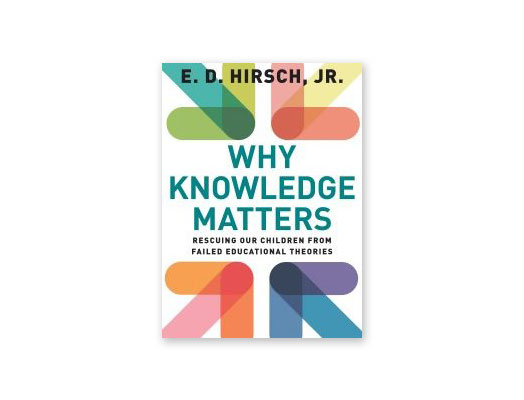The ideas that thirty years ago prodded a scholar of English literature from the halls of academe into elementary school classrooms continue to motivate E. D. Hirsch, Jr. today. “I am still chiefly motivated by the social injustice of our dominant theories and their unwitting destruction of the American dream,” Dr. Hirsch affirms in the prologue to his new book, Why Knowledge Matters, published by Harvard Education Press.
According to Dr. Hirsch, “American teachers (along with their students) are . . . being blamed for intellectual failings that permeate the system within which they must work.” The real problem, says Dr. Hirsch, lies in “failed educational theories,” in particular:
- Early education should be appropriate to the child’s age and nature, as part of a natural developmental process.
- Early education should be individualized as far as possible—to follow the learning styles and interests of each developing student.
- The unifying aim of education is to develop critical thinking and other general skills.
These ideas, while attractive, are misguided, says Dr. Hirsch. Rather, he says, “the unifying aim of early schooling” should be to impart “communal knowledge”—that is, “the enabling knowledge that is possessed by the most successful adults in the wider society,” the shared body of knowledge taken for granted by literate writers and speakers.
“The key task facing our elementary schools,” Dr. Hirsch urges, “is to shift from the goal of self-realization to the goal of community—from child-centeredness to community-centeredness. No sensible person would disparage either goal. But the emphasis must shift decisively for the sake of the community and the individual child.”
In various chapters Dr. Hirsch analyzes specific obstacles to the embrace of communal knowledge as the central goal of schooling. He notes the pernicious pressure of high-stakes tests that drive teachers to focus instruction on skills in language arts and math while crowding out history, geography, science, literature, and the arts. He objects to the “scapegoating” of teachers subjected to “value-added” evaluations of their effectiveness. He explores shortcomings in implementation of the Common Core language arts standards. He documents a recent dramatic decline in French educational achievement, when the nation’s schools shifted from “community-centered and knowledge-centered” to “child-centered and skills-centered”—in other words, when the French “Americanized” their school system.
If schools are to impart necessary communal knowledge, says Dr. Hirsch, then they need to follow a coherent, cumulative, and content-specific curriculum. One model of such a curriculum is the Core Knowledge Sequence (freely available from the Foundation). Dr. Hirsch openly welcomes other models. He explains that the Core Knowledge Sequence “has always been offered as just one exemplification” of the “general communal principle . . . that every child in a democracy should have access to that shared, enabling knowledge and language.”
Whatever the curricular model, in his new book Dr. Hirsch compellingly makes the case that “only a well-rounded, knowledge-specific curriculum can impart needed knowledge to all children and overcome inequality of opportunity.”
Why Knowledge Matters may be ordered from the Core Knowledge Foundation.
Read “The Tyranny of Three Ideas,” the Prologue to Why Knowledge Matters.
A chapter adapted from Why Knowledge Matters is featured in the The Atlantic—“Don’t Blame the Teachers.”
